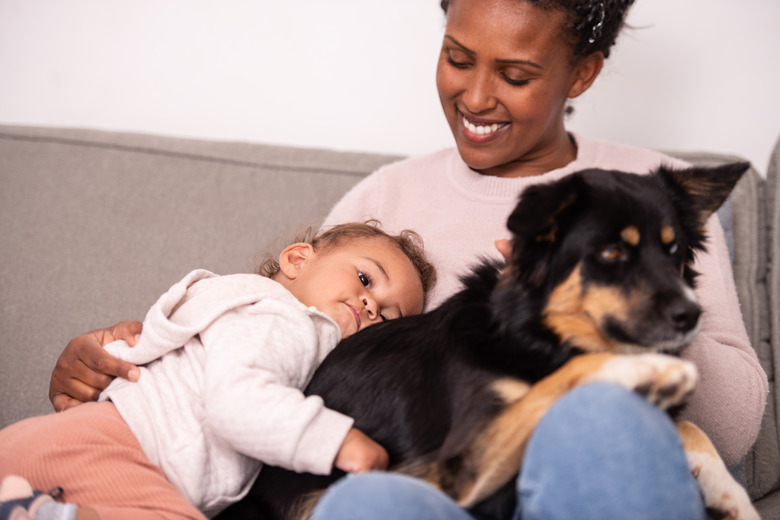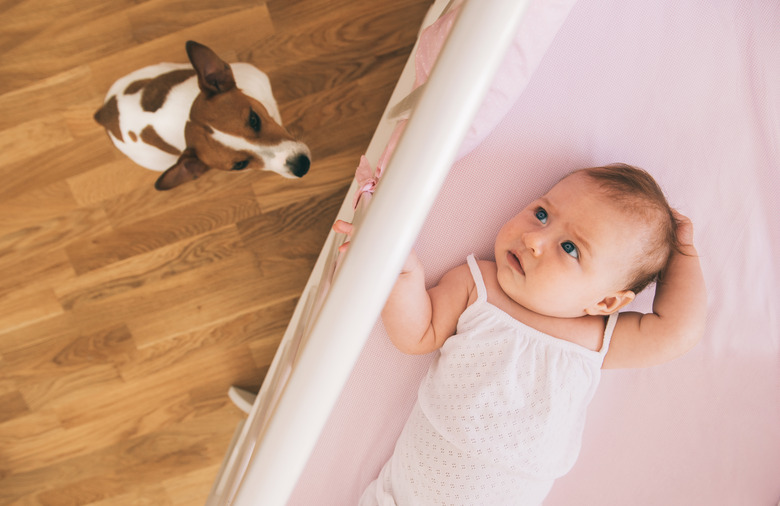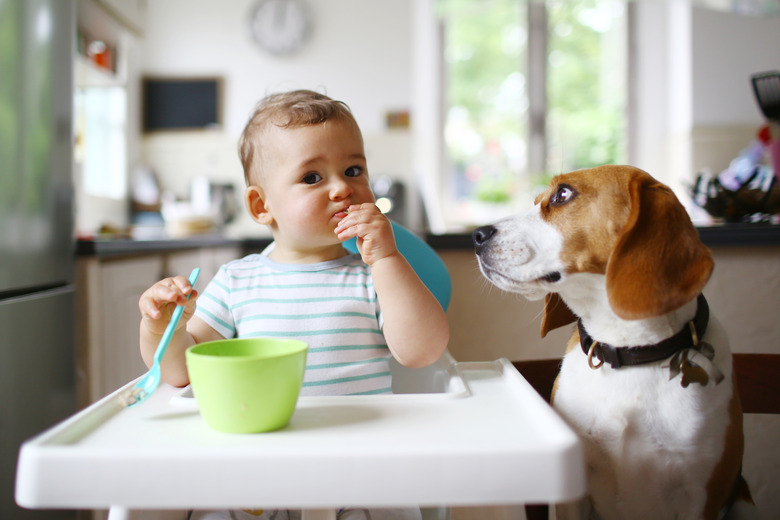Why Does My Dog Love Babies?
Dogs are friendly, loving creatures. Most dogs love most people, that's true. But there are some dogs who seem to have an extra reserve of love in their hearts for a very special kind of human: babies. What do dogs think of babies? It's hard to know for certain, but studying behavior shows evidence of fondness, both dog for baby and baby for dog.
Why do dogs love babies?
Why do dogs love babies?
There are a few things that could explain dogs' love for babies. The biggest factor might just be the same thing that made you connect with your best friend—they have a lot in common.
Part of the reason dogs and babies get along so well is because they're similar. Dogs and babies are the only two things on earth who view the world with sincere awe and joy most of the time. Like puppies and dogs, human babies have a desire for attention — specifically, for a playmate. Dogs and young kids share this trait too.
Additionally, part of the appeal is probably right under your dog's nose. Smell plays a huge role in everything that dogs love because it's their primary sense for experiencing the world. It's possible that babies smell differently to our dogs than human adults do, which might help them connect with babies on a special level.
Some dogs love all babies, but all baby-loving dogs love their own babies—not puppies, but the human babies who are members of their own family—the most. This comes down to basic dog biology. dogs, being the pack animals, have a strong sense of who their family is and get very protective of their owners. This, naturally, extends doubly to the humans they love who aren't big enough to protect themselves.
Why do babies love dogs?
Why do babies love dogs?
When it comes to dogs loving babies, we have to make some assumptions. With babies, however, we have some research. Scientists have conducted studies about older kids and their love for dogs, so we don't have to guess why kids love dogs.
In 2017, Cambridge researchers released a study of 12-year-olds and their pets. The study examined kids and pups from 77 British households and researchers directly asked the kids about the quality of their relationships with their families — including their pets. Specifically, the researchers gathered information about their satisfaction with the relationships, their feelings of companionship, communication in the relationships, and conflict in the relationships.
The kids in the study said they had less conflict with their pets than with other family members, such as siblings. The kids also reported feeling more satisfaction with their relationships with their pets and feeling more bonded to their pets than to siblings. The results indicated that kids like their pets more than they like their brothers and sisters. The bond between kids and dogs is a natural and deeply felt.
Not only do kids love dogs, dogs are demonstrably great for kids. Babies who are raised around dogs have stronger immune systems, for example. Other benefits of growing up around a dog include a lower risk of developing allergies and a lower risk of asthma.
The health benefits kids reap when they grow up around dogs aren't just physical. Kids who grow up with dogs in their home enjoy a range of mental health benefits, as well, including better self-esteem, increased compassion, improved cognitive skills, less stress, and a generally happier outlook on life.
Why are some dogs naturally gentle with babies?
Why are some dogs naturally gentle with babies?
Dogs are extremely social creatures with a very high level of emotional intelligence, all things considered. As such, many of them are able to read the room or pick up on subtle clues from the people around them.
Dogs pick up on different cues from the people around them, and they can sense that a human baby is harmless and vulnerable. In some cases, being around babies will actually activate a dog's protective parental instincts. Some dogs will interact with the baby in the same way a mother dog will interact with her pups, including sniffing or licking a baby's face.
Why are dogs protective of babies?
Why are dogs protective of babies?
Given their deep love for and connection to babies, it's not surprising that baby-loving dogs are also often baby-protecting dogs. Remember, dogs are naturally protective of members of their packs, so it's not a stretch they are also protective of babies. But some dogs take baby protection to a bit too far.
Dogs who have been bred with specific protective characteristics are generally inclined to go all out protecting children. For instance, herding dogs like collies are bred to keep the pack together. These breeds are unlikely to let a child wander off or move out of sight. Golden retrievers are known to be gentle and patient with kids and babies, and beagles love being a part of the family pack. Lapdogs, however, might not have the same instinct.
References
- American Kennel Club: Dogs and Babies: A Look at Their Special Relationship
- One Green Planet: Dogs Who Love Their Human Babies Like Their Own
- University of Cambridge: Pets are a Child's Best Friend, Not Their Siblings
- Independent: Living with dogs can help protect babies from range of illnesses like asthma
- American Kennel Club: The Many Ways Kids Benefit from Having a Dog
- Family Minded: Best Dog Breeds for Babies


